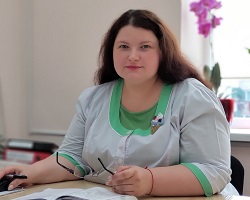Nadiya Labanda: coordinating nurses in Ukraine’s COVID-19 epicentre

Nadiya Labanda
Chernivtsi Province in western Ukraine was the first to detect novel coronavirus infections in the country and now has the highest number of confirmed COVID-19 cases after the capital Kyiv. On 11 March, WHO delivered more than 7000 protection kits to the Chernivtsi Province Hospital, including medical masks and particulate respirators, gloves, goggles and protective clothing.
“I have been the Chief Nurse of Chernivtsi Province since February 2020 and I coordinate the work of almost 7000 nurses,” says Nadiya Labanda.
“The first case of the novel coronavirus in Ukraine was identified in our province in early March and there are now 143 people diagnosed with COVID-19 here. Within the province, Khotyn District is the one most affected by the virus – here 10 health workers have been infected.
“At the beginning of the quarantine, I travelled the province to help prepare care and infection control at hospitals. Now, when traveling is restricted, I communicate with nurses online or over the phone.
“Nurses are at high risk of being infected, as we spend most of our time in close contact with patients. People have already gained an increased understanding of the importance of our work and are expressing their gratitude either in person or on social media. Some have also donated sanitizers, detergents and protective gowns for health-care workers.”
Recognizing the role of nurses
“I have known I wanted to be a nurse ever since I was a child, when I looked up at health-care workers as heroes in their white uniforms. I began my initial studies at a medical college in Chernivtsi, but I knew I wanted to pursue further studies. After graduating from college, I continued my studies at the university and eventually completed a master’s degree in nursing.
“It has been difficult for us nurses to get the recognition we deserve and to be acknowledged as a profession with an independent scope of practice. Through my own work, I want to showcase the important role that our profession plays in patients’ health outcomes.
“This is also what I wanted to convey during my speech at the first national competition on the development of nursing in Ukraine, where I was awarded third place. I am pleased I could present my ideas to experts from the health-care community, as it reinforces my hope for change. Soon after the competition, I was appointed the province’s chief nurse.”
Varied responsibilities during and despite the COVID-19 pandemic
“In my work I am particularly dedicated to the Bukovyna Provincial Children's Rehabilitation Centre, where we work with children with neurological conditions, predominantly cerebral palsy, from all over Ukraine. There, I manage 42 nurses who work directly with the children. The nurses at the centre have a good working relationship with other health-care workers, and their professional opinions and assessments are highly valued.
“My regular responsibilities also include certifying nurses and paramedics, consulting with nurses, discussing prescriptions for treatment and developing projects for the province. I also remotely teach nursing at a college affiliated with Odesa Law Academy.
“Due to the COVID-19 pandemic, many of my projects have been postponed. To monitor the spread of COVID-19, I keep close contact with the head nurses from all 11 districts in the province, over the phone and online.
“As the virus is spreading, we are expecting new government supplies of personal protective equipment that are now being produced. We hope we will get them in time.”



